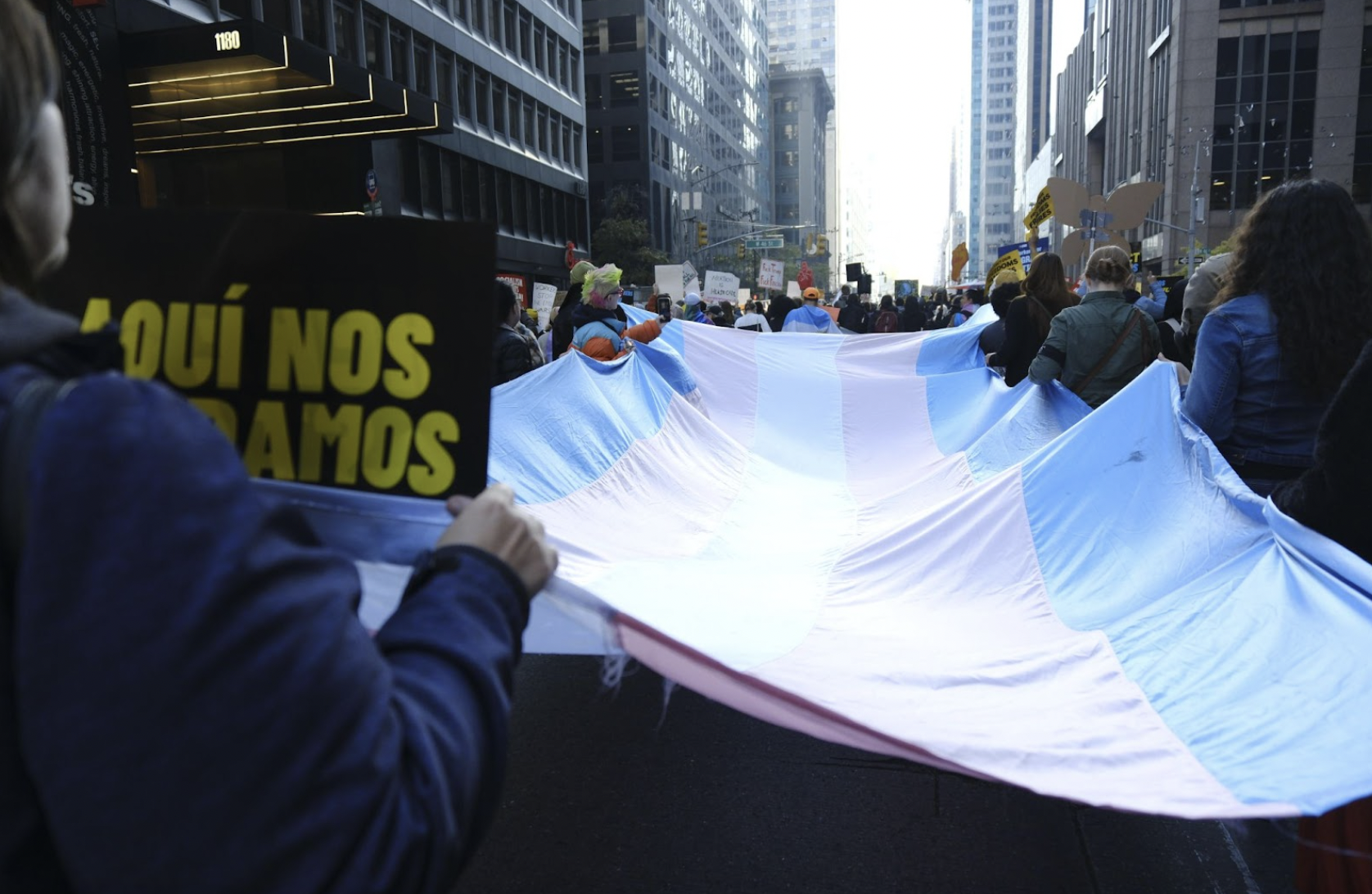
Grassroots organizations marched in midtown Manhattan, NYC, during the “Protect our Futures March” in response to Donald Trump’s election victory. Nov. 9, 2024 (Credit: Alice Finno)
On the morning of Nov. 6, Audrey Shoop woke up to see their partner silently crying in the doorway of their apartment. “I didn’t even have to ask what was going on,” they said. “I kind of knew.”
For the 22-year-old nonbinary Virginia resident and their girlfriend, the announcement of former president Donald Trump’s reelection was “devastating”.
“More than half the popular vote of Americans was for a person who is standing for a community where people like me don’t even exist,” said Shoop. “It’s scary to think that my identity could be erased.”
Like Shoop, many transgender and gender nonconforming people across the country have expressed growing fears after the election of Trump, who made anti-trans messaging a key part of his campaign. The AP reports that LGBTQ+ crisis hotlines have been flooded since then.
In New York State, where 0,5% of the population, or about 76,000 people, identifies as transgender, legal protections for trans people are among the strongest in the country. But anxiety is still high for many who worry about the impact that the upcoming Trump presidency could have on their access to healthcare and their safety.
In the weeks after the election, Lyndsay Mottola, a nonbinary social worker at Brooklyn Community Pride Center, has been answering questions and listening to fears from members of the trans community from all over New York City.
“At first, I was sort of like, I don’t know how to be a therapist through something like this,” they said. “I felt overwhelmed. I also felt really scared for my community, especially the most vulnerable folks in my community. And I knew that, you know, folks were gonna have a lot of questions that I don’t really have the answer to,” Mottola said.
Many of the people they talked to were worried about maintaining their access to gender-affirming care, such as hormone replacement therapy and gender-affirming surgery, during the next four years, Mottola said.
Trump has been vocal about his intention to ban gender-affirming care for minors in all 50 states, and to ban hospitals that provide this type of care from receiving Medicare and Medicaid funding. Some of his proposed policies include rollbacks on Title IX protections for trans people, and the end of all federal agencies programs that “promote the concept of sex and gender transition at any age”.
With anxieties high across the board, members of the community are having different reactions to the results, Mottola said.
“Some people are ready for a fight, some people are just really scared, some people are going to run away. And it’s all just like trauma responses that we’re kind of having in response to this,” they said.
For some trans people, this could mean leaving red states in favor of democratic strongholds like New York, where voters approved Proposal One, also known as the Equal Rights Amendment. The ballot proposal, which was adopted by 62% of New York voters, enshrines protections against gender and sexual orientation-based discrimination in the State Constitution. In a video published on Instagram on November 7, Brooklyn Council Member Chi Ossé called on New Yorkers to get ready to welcome an influx of “queer and trans Americans fleeing hatred”.
But others are considering departing the United States altogether.
It’s been Shoop’s thought since the election. The young restaurant worker had already planned on leaving rural Virginia for New York City to pursue career opportunities in theater, they said. But after seeing the election results, Shoop worries that might not be enough.
“Post election, I’m starting to think or wonder how long I’ll even be able to stay in New York,” they said. “Should I give up the city that was built for my career to be safe? That’s just a really weird thing to be thinking of in 2024.”
This has led some Canadian trans activists like Celeste Trianon to sound the alarm on social media about the possibility of a “trans refugee wave” coming from the south. But that remains relatively unlikely, according to Sage Rivera, chief strategy officer for Destination Tomorrow, a LGBTQ+ advocacy organization in the Bronx.
“That’s not something that we hear about now,” they said.
For the next few years, Rivera highlighted the need to tap into the resiliency of a community that is used to fighting for its basic rights.
“Now we’re just in the state of reconciling with what happened and how we move forward from here,” they said.
About the author(s)

Beatrice Vallieres
Béatrice Vallières is an M.S. student at Columbia Journalism School focused on covering politics and the environment.



